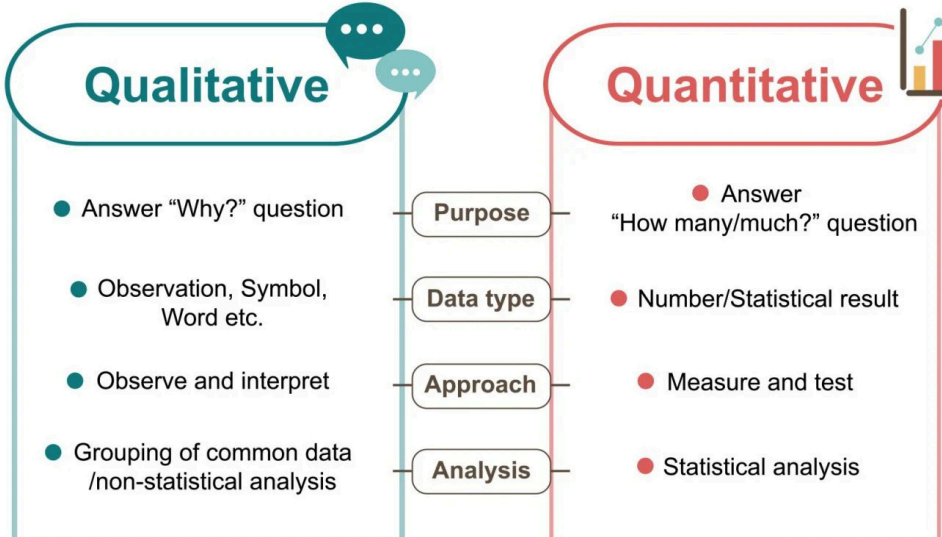Qualitative
Definition (#f7aeae)
Important (#edcae9)
Extra (#fffe9d)
Objectives:
Discuss the assumption of qualitative research.
Describe how researchers respond to the demands of accuracy and reliability.
Explain the process of planning and conducting a research interview.
Discuss face-to-face, telephone and computer-assisted interview.
Explain the process of planning and conducting a focu group.
Describe the ethical issues involved.
Case study | Ethnography |
Detailed investigation about a single event or individual in order to explore complex issues. | Detailed systematic study of people and cultures. |
Focus is on a single event, person. | Observes cultural phenomenon. |
Aims to uncover the tacit knowledge of culture, participants. | Aims to describe the nature of phenomenon through detailed investigation of individual cases. |
May use interviews, questionnaires, observations, analysis of data. | Uses participant observations and interviews. |
Research does not have a particular community. | Researcher has to spend considerable time in that community. |
Assumptions of Qualitative Research:
Emphasis on understanding.
Perspectival view.
Discover patterns.
Human-as-an-instrument.
Hidden tacit knowledge.
Accuracy of Qualitative Research:
Trustworthiness (unbiased)
Ensuring the quality of qualitative research includes credibility, achieved through extended involvement, persistent observation, and triangulation, achieved through comprehensive and detailed explanations.
Verification
Involves ensuring findings are trustworthy.
This is achieved through strategies like credibility, dependability, confirmability, and transferability. These strategies ensure the research is reliable and valid.
Acknowledging subjectivity and bias
Acknowledges subjectivity and researcher bias as components of the research process, not as weaknesses to be avoided, but as crucial factors to be understood and addressed.
Process and sequence
Striving for accuracy involves a systematic process and sequence to ensure the data accurately reflects the research objective and minimizes bias.
This includes careful attention to methods, data analysis, and interpretation.
Interpretation
The accuracy of interpretations relies on ensuring the trustworthiness of the findings.
This is achieved through methods like rigorous coding frameworks, documented analytical decisions, peer debriefing.
Referential adequacy
Focuses on ensuring that findings accurately reflect the lived experiences of participants.
It involves a method of validating research findings by comparing them with the original data
Transparency
It is crucial for accuracy and trustworthiness in qualitative research, ensuring findings reflect the data and are open to scrutiny.
It involves being open about data collection, analysis, and interpretations, allowing others to assess potential biases and the validity of conclusions.
Advantages:
Understanding/explaining personal experiences of individuals.
Focus on subjects own understanding & interpretation.
Researchers experience issues from a participants perspective.
Reports presented in a narrative rather than a statistical form.
Useful in examining personal changes over time.
Focus on human interest issues that are meaningful to managers.
Reliability & Validity:
The researcher should aim to give enough confident in readers that the data is presented as observed and as collected.
Compared to quantitative research, qualitative research uses more flexible questions.
Inductive vs Deductive:
Inductive Reasoning:
Specific observations → Pattern recognition → General conclusion
Deductive Reasoning:
Existing theory → Formulate hypothesis → Collect data → Analyse data → Accept/reject- hypothesis
Intensive interview:
Uses smaller sample but longer sessions, allowing the researcher to get more information on respondents opinions, values, motivations etc.
Co-op payments are higher than survey or interview.
Longer period of analysis.
Interviews should be well scheduled to avoid fatigue and boredom.
General guidelines:
Appearance (Look presentable, professional)
Familiarize yourself with the questions to be asked.
Recording responses exactly.
Provide words of encouragements.
Active listening.
Avoid close-ended questions, except for biographical data collection.
Avoid biased questions.
If using research assistants, ensure that they are trained and monitored.
Clear voice, suitable accent, avoid distraction, inform if there is any distracting condition.
